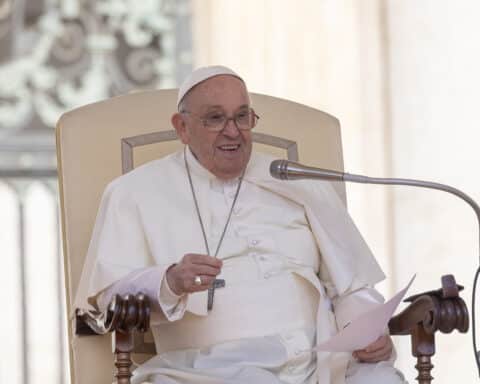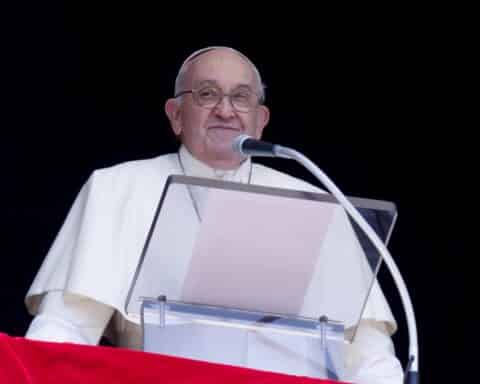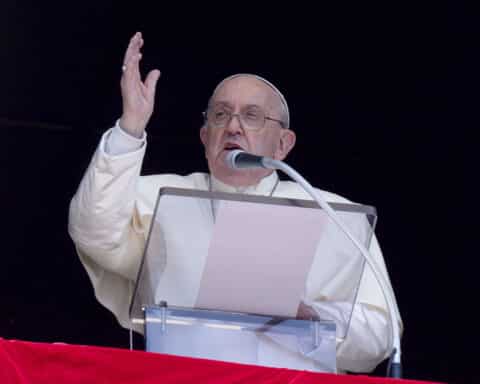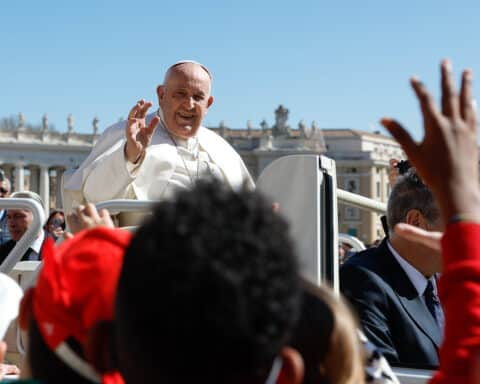When he speaks with reporters, Pope Francis often sounds like an old journalism professor reminding them to ask the right questions and to fact-check their stories.
Addressing the Foreign Press Association of Italy on May 18, the Holy Father emphasized familiar themes from his previous talks with journalists, such as the importance of their profession to an informed, self-governing society, and the dangers of misinformation.
“We need journalists who are on the side of the victims … of those who are persecuted, on the side of those who are excluded, discarded, discriminated against,” the pope said in his Vatican address to a gathering of about 400 journalists.
The pope’s address was just the latest example of the high ideals he holds for journalism, which he said “contributes to the search for the truth.” And in a time when authoritarian leaders are seeking to restrict and delegitimize the news media for critical coverage, Pope Francis defended freedom of the press as “an important indicator of the state of health of a country.”
Essential part of democracy
“It’s certainly gratifying and reassuring to have a leader like Pope Francis to state what many of us already know to be true — that journalism is an essential part of a democracy,” said Richard G. Jones, the Walter H. Annenberg-Edmund P. Joyce Director of the John W. Gallivan Program in Journalism, Ethics and Democracy at the University of Notre Dame.
Jones told Our Sunday Visitor that he believes the Argentine pope, who was a high-ranking churchman when a repressive military junta took power in that country in 1976, approaches the issue of press freedom from the perspective of social justice and truth.
“At this time when journalism is under assault from so many different quarters, where we see journalists around the world who are in literal physical danger because they’re trying to practice their craft, it is very reassuring to hear the pope’s message at this time,” Jones said.
Greg Erlandson, the editor of Catholic News Service, told OSV that Pope Francis, in his talks on journalism, often quotes his immediate predecessors, Popes John Paul II and Benedict XVI, both of whom also spoke about the importance of a professional and ethical news media.
“On the one hand, journalism at its ideal is simpatico with the Gospel in the sense that the truth will set you free. There is a dedication to truth,” said Erlandson, who is also a former editor, president and publisher of Our Sunday Visitor.
Pursuit of the truth
“There is obviously a tension at times where the Church can feel as if it’s being targeted or persecuted by the media, but at same time the inherent principles of a free press — seeking fairly to pursue the truth — I think is compatible with the Gospel,” Erlandson said. “The lay vocation of the journalist is something that a Christian can embrace.”
Recent years, however, have seen a general decline of trust and regard for the Fourth Estate. There are many contributing sociological and economic factors that include the decline of the newspaper industry, the advent of social media and a fragmented media landscape where bloggers and hyper-partisan outlets have taken slices of audience share away from traditional mainstream sources.
“There is the cliched but useful analogy of the perfect storm of various syndromes coming together, a confluence of factors and dynamics that is undermining the reputation of the press,” said David Gibson, the director of Fordham University’s Center on Religion and Culture.
Gibson, a longtime religion journalist who began his career at Vatican Radio and most recently worked as a national reporter for Religion News Service, told OSV that the news media has become “an easy punching bag” for politicians who find audiences that are eager to vent anger at journalists.
“People always love to bash the media. They hate the media because the media reports on things that make people uncomfortable, and it’s never that popular,” Gibson said. “But now, it’s really become, especially on the right wing, a punching bag, and they’re getting a lot of traction with that message.”
Alex Russo, a media studies professor at The Catholic University of America, told OSV that journalism in the United States has long been criticized for bringing uncomfortable truths to light. He said the idea of a liberal bias in the news media has been attributed to Southern politicians, who hated much of the news reporting during the Civil Rights movement. Today, politicians and their allies increasingly attack unflattering news coverage, even if it’s accurate, with the “fake news” smear.
Fake news
“The ‘fake news’ term has become weaponized and used by various figures to dismiss the kinds of news accounts that they don’t want to address, are otherwise critical of, or that place them in a poor light,” Russo said.
Of course, propaganda and misinformation are nothing new. But emerging media economics and technologies make it easier to spread that content far and wide. The Russian government recognized early on the potential of using a social media platform like Facebook to sow confusion. In the 2016 presidential election, Russian-connected troll farms created fake news articles that were shared by millions of users, creating chaos in the American national political debate.
Russo added that several studies that have since analyzed the 2016 elections have found that older people on social media shared those fake news articles more than often their younger counterparts.
“I think that’s because people who are 50 years or older grew up in a different type of media ecosystem, and they haven’t really adjusted to the realities of the ease in which this kind of content can be created,” Russo said.
In his recent Vatican address to reporters, Pope Francis cautioned against the kind of journalism that sells “the rotten food of misinformation,” which in previous talks the pontiff has said breaks down societal bonds by cultivating fear, suspicion and hatred between people.
“He clearly sees the corrosive and dangerous effects of that kind of propaganda,” said Gibson, who believes that the pope sees the press as an ally to countering misinformation and building up a well-functioning society.
“He knows that Catholics are often making choices that he would say are not in line with the Gospel,” Gibson said. “But how much of those choices are informed by the Gospel, and how much are they informed by propaganda?”
Just like the secular press, the world of Catholic media has become fragmented. Perhaps more than ever, observers told OSV that a basic level of media literacy and a willingness to read and view news content outside of one’s echo chamber are incredibly important.
“That’s why I would say it’s only appropriate that as the pope weighs in on various aspects of our contemporary life,” Russo said, “that he would take up the questions around misinformation and the various attacks that have been made on journalists across the world, and the danger that can pose, not just to the particular role of the press but what that means to live in a free society, and indeed what that could ultimately mean for the Catholic faith as something that’s devoted to the search for truth.”
Brian Fraga is a contributing editor for Our Sunday Visitor.
| Pope addresses to German journalists |
|---|
|
When Pope Francis met with a delegation of Catholic, evangelical and public-service journalists from Germany on April 4, Vatican News reported that he stressed three points:
|





